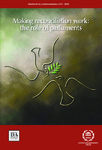Please use this identifier to cite or link to this item:
http://thuvienso.quochoi.vn/handle/11742/38483Full metadata record
| DC Field | Value | Language |
|---|---|---|
| dc.creator | Mr. Mark Freeman | - |
| dc.date.issued | 2005 | - |
| dc.date.submitted | 2016-11-15 | - |
| dc.identifier.isbn | 92-9142-250-9 (IPU) | - |
| dc.identifier.isbn | 91-85391-49-2 (International IDEA) | - |
| dc.identifier.uri | http://hdl.handle.net/11742/38483 | - |
| dc.description.abstract | The Handbook seeks to provide some responses to this question. It does so by setting out the moral, legal and political dilemmas most commonly associated with democratic and post-confl ict transitions, by exploring the meaning of reconciliation and by highlighting the use of transitional justice mechanisms. Most importantly, it examines ways in which parliaments can foster reconciliation in their own countries in times of transition, and highlights what other parliaments can do to contribute to reconciliation. | - |
| dc.format.extent | 26tr. | - |
| dc.language | en | vi |
| dc.subject | IPU 10 | vi |
| dc.subject | General role of parliaments | vi |
| dc.subject | Reconciliation work | vi |
| dc.subject | Parliaments | vi |
| dc.subject | Recommendations regarding multilateral initiatives | vi |
| dc.subject | Justice reforms | vi |
| dc.title | Making reconciliation work: the role of parliaments: Handbook for parliamentarians n°10 | vi |
| dc.type | Cẩm nang | vi |
| dc.source.method | IPU | - |
| Appears in Collections: | Phân quyền - Tổ chức và hoạt động của Quốc hội | |
Files in This Item:
Items in DSpace are protected by copyright, with all rights reserved, unless otherwise indicated.

THƯ VIỆN QUỐC HỘI - VĂN PHÒNG QUỐC HỘI
Địa chỉ: Nhà Quốc Hội, Đường Độc Lập, Ba Đình, Hà Nội
Điện thoại: 080.41947
Email: thuvienquochoi@quochoi.vn




